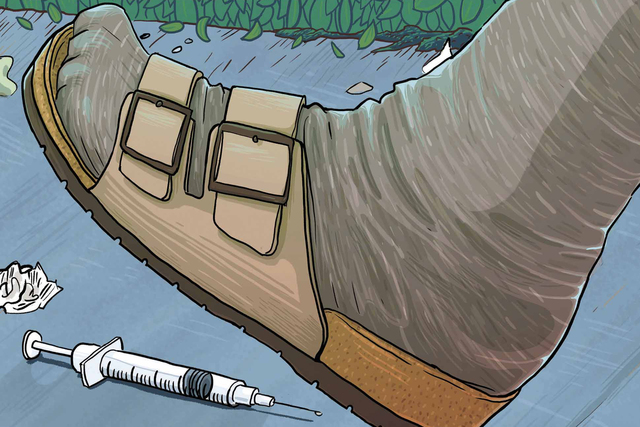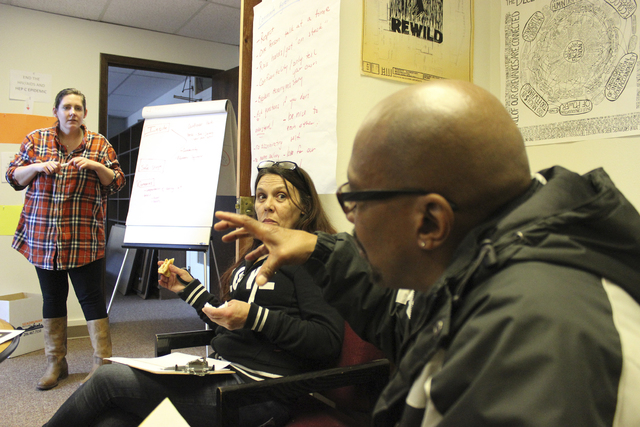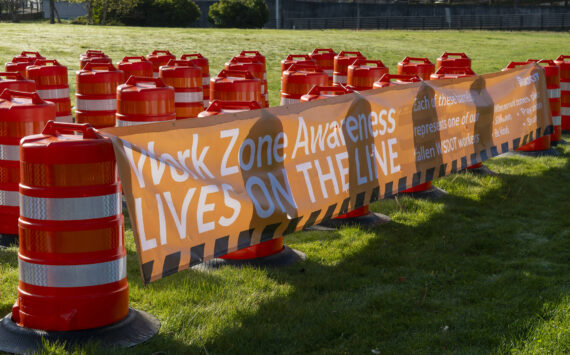A s he has so many times before, Seattle Councilmember Mike O’Brien faces the hostile crowd. His hands hang together at his waist, fingers interlinked, in the body-language equivalent of a concerned frown. The date is January 6, 2016, and O’Brien is playing defense at a community meeting inside the Magnolia United Church of Christ.
The acronym for the Neighborhood Safety Alliance, an anti-crime activist group, is projected on the wall behind him. A woman from the audience holds the meeting’s sole microphone. She accuses O’Brien of ordering Seattle police not to arrest people who have been camping in RVs parked on neighborhood streets. Assistant Chief Steve Wilske stands off to the side in a dark-blue uniform and light-gray cowboy mustache, next to Councilmember Sally Bagshaw, city attorney Pete Holmes, and mayoral public-safety advisor Scott Lindsay. Wilske has already categorically denied to the crowd the existence of any such “stand down” directive. Twice. But that doesn’t stop the commenter from repeating the allegation. “What is the nature of this ‘stand-down’ [directive]?” she asks. “Because it does exist. Was it from the mayor and the Council?”
This commenter is not alone in her belief that the highest echelons of city government have issued a secret order to ignore crimes committed by homeless people. Rumors of the “stand-down” directive, largely based on “off-the-record” comments from street cops to concerned neighbors, are so widespread that soon after this meeting, SPD will publish a blog post detailing the many homeless people and RV dwellers it has arrested in the past month.
O’Brien is handed the mic and turns to the audience member. “We have never issued any directive,” he says. “But. The police are not going to arrest someone for being poor.”
The pale, well-heeled audience of several hundred middle-aged Seattleites explodes. Everyone shouts at once, creating a guttural roar that fills the meeting hall. A few people clap. Several boo. “That’s not what we’re saying!” people yell. “No one cares!” “Go away!” “Nobody suggested that!”
An NSA moderator takes the mic from O’Brien and hands it to Harley Lever, a Magnolia resident who says Seattle police blew him off last year after RV dwellers stole his TV and threatened him. Lever told KIRO that when officers finally did show up, “They basically told me that there is a hands-off order when it comes to homelessness.”
A solid man wearing office clothes and a trimmed beard, Lever holds the mic in front of his face, turns to the crowd, and assures them, “All right, I’ll get to the bottom of this right here.” He turns to face his antagonist. “Councilman O’Brien,” Lever says, “thank you for coming out. I know it’s not the most welcoming crowd right now, but, uh, you kind of deserved it.” Enthused applause. “Here’s what the problem is. You tell us about getting porta-potties and [disposal bins for used] needles and setting up food. We’re talking about criminals. So when you sit there and you say, ‘Hey, I’m going to give the criminals more porta-potties, I’m going to give them a place to have water’—we don’t want that. What we want to know is what are you going to do specifically to get the criminal element out of this city?”
He waits for the applause to die down. “I’m a hundred percent with you, though: We don’t want to punish the homeless. The homeless are the most vulnerable! Again, the homeless are the first victims of these people. We’ve got sex traffickers, we’ve got drug dealers, we’ve got drug manufacturers, and we’ve got criminal crime rates. So when you say you wanna give these guys porta-potties and help them access food, you’re horrifying us!
“So with that said,” he concludes, “what specifically are you going to do to purge the criminals out of there?”
Meet the Seattle Neighborhood Safety Alliance. The four-month-old group is the latest outgrowth of the Emerald City’s prolonged homelessness crisis. For the past year or so, RV parking in residential neighborhoods including Ballard and Magnolia has been on the rise, as houseless car campers search for spaces where they’re legally allowed to exist. Unsurprisingly, this has frustrated nearby homeowners, who blame RVs and homelessness more generally for the (very real) wave of property crime that’s swept their neighborhoods in the past year. In January, Lever called the RV situation “a death sentence” for nearby homeowners, and anger over a perceived connection between RV parking and crime (which is tenuously supported by police statistics) has been a unifying theme at NSA meetings.
Two weeks after O’Brien faces the hostile crowd, the mayor will create a temporary “safe lot” for RVs in Ballard, complete with running water and 24-hour staffing. The cost for the safe lot, it will later turn out, is about $1,750 per vehicle—enough to pay for a market-rate apartment.
A breathtaking waste of public resources, designed for optics rather than substance? That’s debatable. What is certain is that city leaders have taken notice of the NSA’s complaints. This is a real constituency with the real potential to influence policy in a city where it is possible for a well-organized faction of the populace to ride popular sentiment into power.
It remains to be seen whether the NSA will use its dawning influence for good or ill, be driven by fear or love, pull the city up or down in its prolonged quest to stem this human tide.
Two months after the early January meeting, Cindy Pierce meets me in a cafe to talk about the NSA. Joined by co-organizer Gretchen Taylor, Pierce explains that the idea of putting together an anti-crime interest group came to her after she attended an 11-week workshop hosted by SPD. The workshop, intended to educate citizens on how law enforcement works, got her thinking about whether and how the law was being enforced in her own backyard.
“I went on NextDoor and I asked if anyone was as upset as I was about the RVs in our neighborhoods and the trash that they were leaving,” she says. “It was more about the trash than anything else. And I got this overwhelming response, and we just kind of went from there.”
But the NSA’s platform is about much more than litter, she says. Fundamentally, it’s about public safety and the rule of law. Pierce is telling me that “I don’t believe it’s OK to have drug addicts wandering around” when Sidney Wilson, a homeless ex-junkie who advocates for safe drug sites in Seattle, suddenly and unexpectedly appears beside us.“I heard you talking about the [homeless] and needles and everything,” he tells us. “I [thought to myself], ‘This conversation sounds familiar. I’m going to come over and listen.’ ”
Pierce and Taylor ask him about his work to bring safe drug sites to Seattle. They nod and ask questions as he tells them about harm reduction and stakeholder organizing. The women appear genuinely interested in his pitch. Eventually I cut in. “We’re actually doing an interview right now,” I tell Wilson. “I hate to blow you off, but do you mind if I blow you off?” Everyone chuckles, and the interview resumes.
“We probably have the reputation of being the bad guy—and we’re not,” Pierce says, referring to the perception that “We’re anti-homeless and we’re bad and we’re mean because we’re anti-homeless.”
“That’s not us at all,” she says. “Yes, we didn’t want the RVs causing the garbage and the filth and the needles and the drugs and everything in our neighborhoods. And yes, we as citizens deserve to live in a clean city … We’re compassionate people, but we probably have more of a tough-love stance than maybe the city does or some people do.”
“How about ‘realistic’?” offers Taylor.
While RVs are a top priority, all forms of homelessness-related crime are on the NSA’s agenda. Pierce recalls a discussion she had recently with a homeless man under the Magnolia Bridge, an area that she describes in hellish terms. She said to the man, “No human being should live this way. What can we do to help you? Seattle offers so many services, and we want you to be in a warm, special place.”
According to her, the man replied, “Well, there’s something wrong with my brain, and I’ve been in prison twice, and I don’t want anybody—I want my freedom. I just want to be left alone. I want to do what I want to do.”
This doesn’t fly with Pierce. “Well, unfortunately, [he’s] in a city where it’s illegal to urinate on city streets, it’s illegal to defecate in city streets, so [he’s] doing illegal activities. It’s illegal to camp in certain places.
“I don’t think we as a city should be paying for [someone] who says, ‘Let me live my life. I’m going to live in a tent. I’m going to go to all the free services that you offer, and I’m going to shit and piss all over this city, and I don’t give a rip.’ I don’t really buy that,” says Pierce. “I don’t like it. You need to respect—you need to follow law, the laws and the rules of the city. I don’t think it’s that difficult.
“I do not have the answer for what we should do with [the homeless],” she continues, “because my answer is not what they want. They need to be in treatment. They need to have shelter. They need it. I think we should force them to do it, because what they’re doing is illegal out in the streets.
“If they don’t want to do it, we don’t have a place for them in the city.”
Attempting to isolate and purge the criminal element from among the poor is a time-honored American tradition. But in practice, the criminal element proves hard to pinpoint, since poor people in the real world aren’t neatly sorted into helpless victims and ruthless predators.
Take Sidney Wilson, the drug-policy activist mentioned above. His biography fits the stereotype of a ruthless drug criminal. He spoke to Seattle Weekly last month about his work with the activist group VOCAL to bring safe drug sites and harm-reduction (as opposed to abstinence-obsessed) drug policy to Seattle. Today Wilson is pushing 60, and he’s run out of steam. “I don’t drink, I don’t do none of that madness anymore,” he says. “I realized that I wasn’t designed to live in the streets … Crack took everything from me. I can’t live like that again. I’m not built like that no more.”
Wilson says he’s been clean for a decade. But once upon a time, the man was a hard motherfucker.
“I used to [use],” he says in the Public Defender Officer where VOCAL holds its meetings, peering through rectangular black eyeglasses. “I smoked crack, I’d shoot dope, I did everything.”
In ’80s Philadelphia, Wilson says, he went to heroin “shooting galleries” where junkies could sit down, shoot up, and then lay back and chill for the duration of their high, if they wanted. “But when crack came out” in the mid-’80s, he says, “in the crackhouses it was a whole different story. You go in there, you have to usually pay to sit there to smoke, and literally they’ll let you sit there until you’re broke. And then once you’re broke, you gotta go … Most people, they always leave broke.”
Unfortunately for Wilson, he lived during both an escalation of the War on Drugs and the dismemberment of the federal welfare system—the Reagan administration’s twin attempts to purge the criminal element from among the nation’s poor.
Seattle, like Wilson’s hometown of Philadelphia, drank the drug-panic Kool-Aid. In 1986, police told The Seattle Times that neighborhoods were suffering traffic jams from all the people driving to crack dealers’ houses for their fix. “It’s kind of like the fast-food franchise of the drug business,” said one police captain. Starting that year, drug arrests in Seattle skyrocketed, driven by crack arrests. At the same time—that is, between 1979 and 1986—Seattle lost 96 percent of its federal housing assistance, according to the Times. “30,000 very low-income households still need housing help,” the paper reported in 1986. “The most visible are the 3,500 homeless mentally ill who stand on street corners and crowd into emergency shelters.” And from Reagan onward, federal leaders became obsessed with restricting welfare to only the deserving poor.
As a number of authors, including Michelle Alexander in The New Jim Crow: Mass Incarceration in the Age of Colorblindness, have argued, these policies of merit-based welfare and heavy policing of the unmeritorious contribute to the drug crime and homelessness that so disturb the NSA. They are also, ironically, the policies NSA leaders propose as a response to drug crime and homelessness.
Keeping people, housed and otherwise, from being pushed out of Seattle is John Fox’s calling. A co-founder of the Seattle Displacement Coalition, Fox has been rousing the rabble against the capitalist machine since 1977, when he helped organize against the widespread housing-finance schemes that were disenfranchising black residents at the time. Since then, he’s been fighting for any underdog he can find, from poor renters to neighbors organizing against big developers to street kids in the U District to homeless campers beneath I-5.
Along the way he’s become a close ally of neighborhood activists. Interviewed for a story last year, Fox told Seattle Weekly [“Anatomy of a NIMBY,” Nov. 11, 2015] that he sees the preservation of high-quality public resources—like parks and transit—as a prime example of how “poor people’s issues … overlap with the issues of neighborhoods.” Contacted for his reaction to the NSA, Fox says he takes a “very dim view of any individuals or group who confuse the problem of public safety and crime, who conflate those issues with homelessness.
“The roots of homelessness, the roots of inequality, are tied directly back to some of these [historical] growth and development issues that are adversely affecting the quality of life in our communities. Neighborhoods are seeing a by-product of failure on the part of our leaders to manage growth.”
The NSA’s ire is, in his view, a consequence of that managerial failure. In other words, they’re blaming individuals (homeless people) for a system-level problem.“This is an easy way, or rather the most tangible way, that some people can vent,” Fox says. “They can hold these meetings, and scream and yell … and call for more cops, and point a finger at the most vulnerable in our communities. And blame them, instead of the people who are making public-policy decisions that are causing these inequalities in the first place.”
Fox, a quintessential neighborhood activist, is quick to disassociate himself from the NSA’s “neighborhood safety” platform. “These are not a product, in my view, of neighborhood activism and the people we work with, leaders who’ve put energy and effort for years into improving the characteristics, the quality, the livability and affordability of their neighborhoods,” says Fox. “This looks more like a group of vigilantes.”
Democratic party organizer Michael Maddux shares Fox’s concern that the NSA’s constituents aren’t distinguishing between criminals and the homeless per se, “with the assumption that all people experiencing homelessness are de facto criminals.” Maddux, who lost a close race for Seattle City Council last fall, was himself homeless for a period as a teenager after coming out as gay. That experience shapes his understanding of how homelessness works, and helps him to frame “solutions from a [stand]point of remembering that people are people.”
The so-called “tough-love” solutions he’s heard from the NSA, Maddux says, don’t meet that criterion. “There still remains this belief,” he says, “that if we don’t force people to stop using drugs, then we’re just suddenly enabling people. And that if we don’t force people to take services, then they’re ‘service resistant’ and we shouldn’t help them at all.”
For instance, at a January 28 meeting of the NSA that Maddux attended, “there was no desire to look at a more broad set of proposals at the time to address homelessness as well as addiction,” he says. “Instead it was all about [urging the city to] ‘Enforce the law [and] clean up our neighborhoods.’ ”
To Maddux, this attitude ignores the actual facts of homelessness. “There’s no data anywhere in the world,” he says, “to suggest that if you tell people ‘We’re not going to help you unless you obey all of the rules that we provide for you’ … actually does anything good for society as a whole.”
Even bearing Fox and Maddux’s criticisms in mind, the rise of the NSA implies at least one significant benefit to the rest of the city. While its members’ own statements illustrate the NSA’s conservative, penal, systems-ignorant understanding of homelessness and addiction, history has shown that such views can change for people who admit the possibility of new evidence and explanations. Pierce and Taylor appear to possess these qualities.
“I’ve been really impressed by their willingness to come back and talk,” says Bagshaw.
Of the January 6 meeting where she watched O’Brien take it on the chin, Bagshaw says, “There was a lot of anger, I think justifiable anger. They didn’t see what the city was doing to … make sure that the garbage was cleaned up.”
Since then, Bagshaw says she’s been thrilled by NSA leaders’ willingness to engage with the complicated causes of the simple problems they’re agitating against. “I wouldn’t say that they’re anti-homeless at all,” says Bagshaw. “In fact, they made a real point about, ‘Look, we want to solve this problem,’ but they don’t want to see people left under the bridges, they don’t want garbage strewn across their neighborhoods, they don’t want people doing drugs in their neighborhoods—and who does?”
The willingness of NSA leaders to engage with real, messy solutions to the problems they oppose was perhaps most clearly illustrated last month at a City Council meeting. The Council was discussing the possibility of bringing safe drug sites to Seattle—like the ones in Vancouver, B.C.—where drug users can inject under the supervision of medical personnel, with counselors standing by for anyone who wants treatment or services. By most measures, the project has been a huge success in the Canadian city since it began in 2003.
After a series of drug-site advocates commented in favor of Seattle’s plan, NSA’s Gretchen Taylor took the mic. “Thank you, Councilwoman Bagshaw, for again creating a forum where people can get together and learn so much,” Taylor began. “I’m very, very appreciative.
“Seattle policy makers, it occurs to me, have not really paid attention to the ongoing lessons from Vancouver. I congratulate you, but I’m also a little appalled. We’re kind of catching up. And thanks to Councilwoman Bagshaw, we’re looking and listening.” Taylor went on to speak in support of the “wisdom” of safe drug sites, while cautioning that neighbors, in order to get on board, would need to see them as part of a larger, comprehensive public-safety strategy.
“Gretchen, thank you so much,” replied Bagshaw, “and I see Cindy [Pierce] in the audience as well.
“What I really respect and am thankful for is the fact that you have turned the energy that was—um, let’s say a lot of energy at our first meeting into something so positive.”










